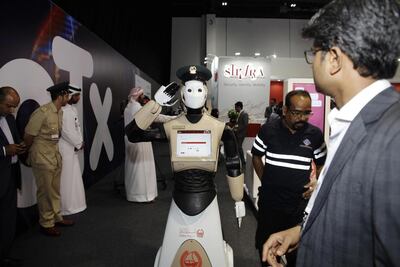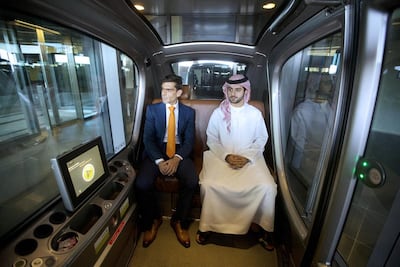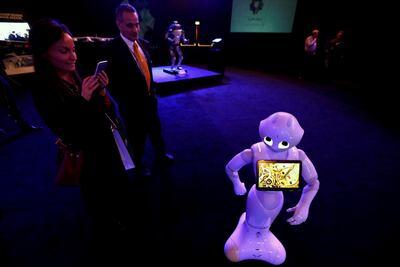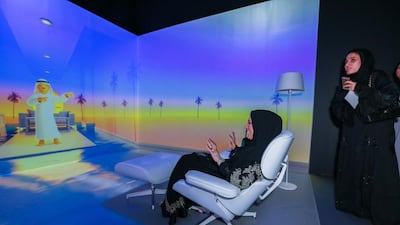The future as it was once imagined is upon us as artificial intelligence moves from the realms of fiction to a technology that is increasingly part of our every day lives.
With practical uses in sectors spanning from healthcare to transport, security and policing, the World Government Summit earlier this week in Dubai focused heavily on the future of AI, it's application and also its potential risks.
Experts painted an at times awe-inspiring, and at other times mildly anxiety-inducing, picture of what we can expect from the technology of tomorrow. Here we look at how experts see life in the UAE and beyond changing over the next 50 years as we prepare for a new life with AI:
In one year
Project Oyoon (eyes) will launch in Dubai in 2018-19 to improve security with tens of thousands of surveillance cameras using artificial intelligence and machine learning to help track criminals.
Facial recognition software will track and analyse movements and then issue warnings to suspects.
Immigration officers will be phased out by 2020 as a new smart system at the developing Abu Dhabi Airport Midfield Terminal will monitor travellers in and out of the country.
Visitors will be able to walk through a scanning tunnel that will monitor their gate, physical characteristic and other unique biometrics, such as iris recognition and finger prints, to ensure a seamless transition through airports.
Both initiatives lean heavily on the latest AI hardware and aim to improve safety and security in the country in the build-up to Expo 2020, while making life more convenient for frequent travellers and tourists.

In five years
Imagine a utopian world in which there are no traffic jams, no traffic lights, no accidents, and zero road rage – a transportation system that enhances human happiness.
The first signs of Dubai edging towards that kind of urban environment could appear within just five years as it aims for a quarter of its transport to be autonomous by 2030.
Autonomous vehicles, or self-driving cars, trucks, and buses, are not merely examples of technology that stand alone in a consumer’s consciousness. They will package together automobile engineering, robotics, AI, big data, city design, and financial innovation in a seamless package that keeps the vehicle moving safely through the urban and highway transportation grids.
This will make more effective use of road networks by increasing the throughput, or capacity, by up to five times.
Construction is planned to begin on the Hyperloop in 2018 – if all approvals are granted – and it is said that it will speed travellers from Dubai to Abu Dhabi in just 12 minutes, firing pods through a magnetic tunnel.
Fake news and digital mistrust could prevail – a trend analysis by Gartner led them to forecast that by 2020, an AI-driven creation of a ‘counterfeit reality’ will lead to so much fake content being created for social media that it will outpace the ability to detect it, fomenting digital distrust.

In 10 years
Robots will begin to replace humans as drivers, which will change the daily commute to work forever.
With the robot at the wheel, figuratively speaking, driving actions will be decided by what will optimise fuel consumption, vehicle wear and reduce the risk of accidents.
But that’s not all. A robotic car would never make a driving decision based on road rage, which is one of the primary causes of accidents and human stress. Human error was cited as the cause of more than 90 per cent of crashes in a National Highway Traffic Safety Administration presentation to the United States Congress.
And if cars are just too 20th century, then drone transport may well be an option for the daily commute –the RTA expects to have taxi drones in the air to take traffic off the roads.

In 25 years
"Superintelligence" is coming and it could extinguish the human race, but there is little governments can do now to control it.
Leading thinkers on superintelligence have defined it as any intelligent system that is radically smarter than the average human brain.
In the near term, governments will play a role in solving the early conflicts arising from superintelligence, such as privacy issues around the medical datasets that are subjected to analysis by artificial intelligence, or the regulation of driverless cars.
In 25 years, many aspects of life from the judiciary system to the financial world could be regulated by superintelligence.
The US$500 billion megacity Neom, planned for Saudi Arabia, is likely to lead the way in developing this superintelligence.
The new city is expected to allow for “a new way of life” and aims to increase safety in the region “while enhancing the competencies of public life activities”. The aim is to have the world’s highest GDP thanks to robot workers.

In 50 years time
Could man set foot on Mars within 50 years? The answer is probably no, but it will be a lot closer to reality than many would believe.
A privately-funded mission to set up a colony on the Red Planet is set for 2031.
Bas Lansdorp, co-founder and chief operating officer of Mars One, rebuffed criticism of a supposed human settlement and said his company is pushing ahead with the trip.
The UAE is to enter the global race to explore outer space with the first Arabic-Islamic probe, which will be developed by an Emirati-only team, set to hit the Red Planet by 2021.
The country has also announced its first astronaut corps, who are expected to set off for the International Space Station in 2020 after several years of intensive training.
At the end of last year, plans to build a Dh500 million Mars Scientific City in Dubai were unveiled. It will simulate life on Mars, and both India and the US have planned upcoming missions to the moon.
__________________
Read more:
Governments must control the rise of Artificial Intelligence, experts say
Cutting edge brain control headset could cut UAE's road deaths
UAE to phase out immigration officers in favour of AI by 2020


